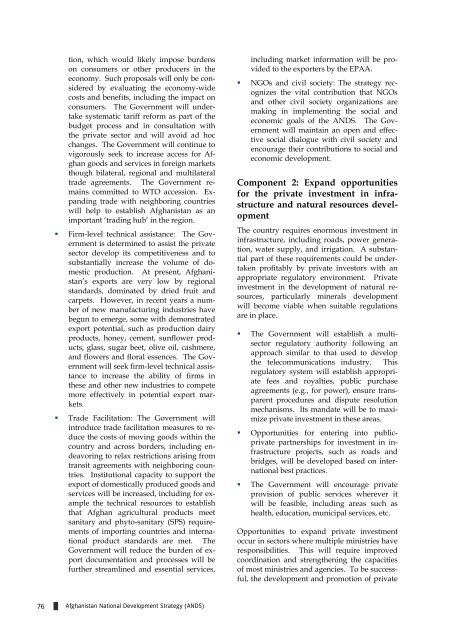Islamic Republic of Afghanistan - Enhanced Integrated Framework ...
Islamic Republic of Afghanistan - Enhanced Integrated Framework ...
Islamic Republic of Afghanistan - Enhanced Integrated Framework ...
You also want an ePaper? Increase the reach of your titles
YUMPU automatically turns print PDFs into web optimized ePapers that Google loves.
tion, which would likely impose burdenson consumers or other producers in theeconomy. Such proposals will only be consideredby evaluating the economy-widecosts and benefits, including the impact onconsumers. The Government will undertakesystematic tariff reform as part <strong>of</strong> thebudget process and in consultation withthe private sector and will avoid ad hocchanges. The Government will continue tovigorously seek to increase access for Afghangoods and services in foreign marketsthough bilateral, regional and multilateraltrade agreements. The Government remainscommitted to WTO accession. Expandingtrade with neighboring countrieswill help to establish <strong>Afghanistan</strong> as animportant ‘trading hub’ in the region.• Firm-level technical assistance: The Governmentis determined to assist the privatesector develop its competitiveness and tosubstantially increase the volume <strong>of</strong> domesticproduction. At present, <strong>Afghanistan</strong>’sexports are very low by regionalstandards, dominated by dried fruit andcarpets. However, in recent years a number<strong>of</strong> new manufacturing industries havebegun to emerge, some with demonstratedexport potential, such as production dairyproducts, honey, cement, sunflower products,glass, sugar beet, olive oil, cashmere,and flowers and floral essences. The Governmentwill seek firm-level technical assistanceto increase the ability <strong>of</strong> firms inthese and other new industries to competemore effectively in potential export markets.• Trade Facilitation: The Government willintroduce trade facilitation measures to reducethe costs <strong>of</strong> moving goods within thecountry and across borders, including endeavoringto relax restrictions arising fromtransit agreements with neighboring countries.Institutional capacity to support theexport <strong>of</strong> domestically produced goods andservices will be increased, including for examplethe technical resources to establishthat Afghan agricultural products meetsanitary and phyto-sanitary (SPS) requirements<strong>of</strong> importing countries and internationalproduct standards are met. TheGovernment will reduce the burden <strong>of</strong> exportdocumentation and processes will befurther streamlined and essential services,including market information will be providedto the exporters by the EPAA.• NGOs and civil society: The strategy recognizesthe vital contribution that NGOsand other civil society organizations aremaking in implementing the social andeconomic goals <strong>of</strong> the ANDS. The Governmentwill maintain an open and effectivesocial dialogue with civil society andencourage their contributions to social andeconomic development.Component 2: Expand opportunitiesfor the private investment in infrastructureand natural resources developmentThe country requires enormous investment ininfrastructure, including roads, power generation,water supply, and irrigation. A substantialpart <strong>of</strong> these requirements could be undertakenpr<strong>of</strong>itably by private investors with anappropriate regulatory environment. Privateinvestment in the development <strong>of</strong> natural resources,particularly minerals developmentwill become viable when suitable regulationsare in place.• The Government will establish a multisectorregulatory authority following anapproach similar to that used to developthe telecommunications industry. Thisregulatory system will establish appropriatefees and royalties, public purchaseagreements (e.g., for power), ensure transparentprocedures and dispute resolutionmechanisms. Its mandate will be to maximizeprivate investment in these areas.• Opportunities for entering into publicprivatepartnerships for investment in infrastructureprojects, such as roads andbridges, will be developed based on internationalbest practices.• The Government will encourage privateprovision <strong>of</strong> public services wherever itwill be feasible, including areas such ashealth, education, municipal services, etc.Opportunities to expand private investmentoccur in sectors where multiple ministries haveresponsibilities. This will require improvedcoordination and strengthening the capacities<strong>of</strong> most ministries and agencies. To be successful,the development and promotion <strong>of</strong> private76<strong>Afghanistan</strong> National Development Strategy (ANDS)
















